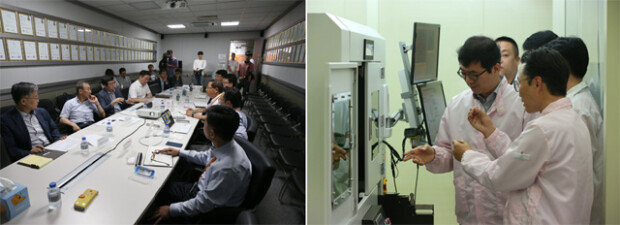KAIST rolls up its sleeves for South Korean companies
KAIST rolls up its sleeves for South Korean companies
Posted October. 18, 2019 07:33,
Updated October. 18, 2019 07:33

The Korea Advanced Institute of Science and Technology (KAIST) formed an advisory board to help domestic companies that are struggling after Japan increased control on the export of materials to South Korea early August. “Cost-saving measures as well as technical solutions will be ready within six months, and businesses are also very passionate about it,” said Kong Hong-jin, a KAIST physics professor and authority on laser. He is currently leading a project to obtain the uniformity of laser beam.
Consisting of former and incumbent KAIST professors, the advisory board was created on Aug. 5 to help domestic companies develop source technologies for materials, parts and equipment. Other institutions are following suit. The Gwangju Institute of Science and Technology (GIST), the Daegu Gyeongbuk Institute of Science and Technology (DGIST) and the Ulsan National Institute of Science and Technology (UNIST) have also announced their plans to set up an advisory group while other universities, including the Pohang University of Science and Technology, formed their own advisory boards to help communities. Any Korean company that wishes to have consultations can submit an application to the application center, which will then be reviewed by experts who offer customized advice.
This move was met with great enthusiasm from South Korean businesses. The number of applications stood at 159 as of Oct. 4. Most of the applicants wanted advice on the areas that are likely to be hit by Japan’s new trade restrictions such as photoresist, semiconductor process equipment and low thermal expansion fluorinated transparent polyimide.
According to Choi Sung-yool, the head of the KAIST advisory board, the applications are concentrated in the areas of materials, semiconductors, display and equipment. He said the advisory board looks at the capabilities of the company and decides if it needs help from experts to make the technologies in South Korea. Out of the 159 cases, 24 are being handled by KAIST and the rest has been referred to other research institutions including KAIST Office of University-Industry Cooperation.
Some businesses are more reluctant than others. Companies need to be open about their trade secrets or vulnerabilities with advisers, and they fear that their efforts to gain competitiveness will backfire and bring about unwanted consequences, which is the leakage of crucial information. “A professor from the advisory group is conducting research for one of our competitors, which make us hesitant about seeking advice,” said an official of a manufacturer based in Cheongju, North Chungcheong Province.
“All consultations are strictly confidential. We would not disclose the name of the company even for a national audit,” Mr. Choi said. “It is imperative to build trust between the business and the group.”
jawon1212@donga.com
Headline News
- Med professors announce intention to leave hospitals starting Thursday
- Bridge honoring Sgt. Moon Jae-sik unveiled in Pennsylvania
- Chief of Staff Chung tells presidential secretaries to stay away from politics
- US FTC bans noncompete agreements
- N. Korea launches cyberattacks on S. Korea's defense companies







